It is up to the West’s democracies to stop another Grozny or Aleppo in Kiev, a leading Ukrainian activist said today.
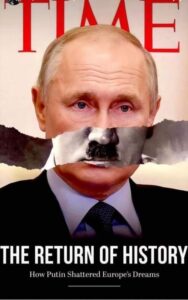 “People in Kyiv are ready to sacrifice their lives,” said Hannah Hopko, former chair of the Ukrainian Parliament’s Foreign Affairs Committee and a civic leader of the EuroMaidan. So the least the West can do is expedite military supplies, end humanitarian aid bottlenecks, declare the Wagner Group a terrorist organization and impose a total trade embargo on Russia, including gas exports to the U.S., she told a forum (above) hosted by the National Endowment for Democracy (NED).
“People in Kyiv are ready to sacrifice their lives,” said Hannah Hopko, former chair of the Ukrainian Parliament’s Foreign Affairs Committee and a civic leader of the EuroMaidan. So the least the West can do is expedite military supplies, end humanitarian aid bottlenecks, declare the Wagner Group a terrorist organization and impose a total trade embargo on Russia, including gas exports to the U.S., she told a forum (above) hosted by the National Endowment for Democracy (NED).
‘Today is my birthday!’ Hopko tweeted today (below). ‘I appeal to @POTUS @BorisJohnson world leaders to make a present to my nation! I have a dream! God will help my dream to come true. #StopPutin.’
“Putin is the Hitler of our modern times,” said Daria Kaleniuk (above), co-founder and executive director of the Anti-Corruption Action Center, adding that the atrocities and concentration camps of World War II were already being replicated in Ukraine.
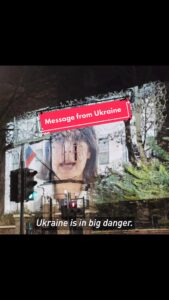
Screen Grab
“Western complicity triggered this war” so democracies share a moral obligation to aid Ukraine. Yet the West has failed to honor the security guarantees given when Ukraine gave up its nuclear arsenal, she said in an impassioned plea for more forceful Western intervention and assistance.
We cannot play by the regular political playbook when we live in extraordinary times, said Kaleniuk, whose face was projected onto Russia’s Embassy in London (right) after she berated the British Prime Minister for his timid response to the invasion.
“Ukrainian women and children are in deep fear because of bombs and missiles coming from the sky. Ukrainian people are desperately asking for the West to protect our sky,” Kaleniuk told Boris Johnson, her voice reverberating with emotion. “Britain guarantees our security under the Budapest Memorandum. So you’re coming to Poland, you are not coming to Kyiv, .. because you are afraid.”
Having met Putin, Oleh Rybachuk, former Chief of Staff to Ukraine’s President Viktor Yushchenko, knew he was ruthless but didn’t anticipate that he would sink to his current level of barbarity. “I thought he’d escalate the war in Donetsk but not bomb the cradle of Kyivan Rus,” he told the NED forum.
“It’s not about us,” he said, referring to his fellow Ukrainian citizens. “There is a global struggle between democracy and autocracy. My question is, who is standing up their hand now, democracy or autocracy?”
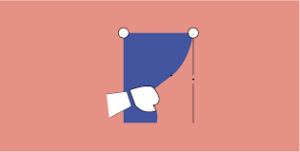 Ukraine’s civil society is engaged in providing logistical assistance to civilian and military forces alike, but also taking time to document Russian atrocities for future war crimes prosecutions, said Olha Aivazovska, the Chairman of the Board at Civil Network OPORA (left).
Ukraine’s civil society is engaged in providing logistical assistance to civilian and military forces alike, but also taking time to document Russian atrocities for future war crimes prosecutions, said Olha Aivazovska, the Chairman of the Board at Civil Network OPORA (left).
“Eight years ago [when Russia occupied Crimea and launched a proxy war], Ukrainians and Ukraine as a state didn’t have any chance to survive, but we have this chance now,” she added.
By contrast, Russia’s civil society – already historically shallow – has been repressed and reduced over decades, the meeting heard, leaving no sufficiently robust counterpart to act in solidarity with its Ukrainian counterpart.
“Even those of us who were wary of Putin did not see this coming,” said the Atlantic Council’s Daniel Fried, a NED board member. Now is not the time for debates about where NATO should draw its red lines, he told the forum. The focus should be on amplifying sanctions and reinforcing an embargo, with Russia’s economy “imploding at a rapid rate.”
And civil society activists should highlight the issues surrounding the delivery of humanitarian and military assistance when they meet U.S. Secretary of State Antony J. Blinken over the weekend, Fried told the meeting, moderated by NED President and CEO Damon Wilson.
NED’s Wilson heard of the “devastating” conditions in Ukraine from Svitlana Zalishchuk (above), a foreign policy advisor to Deputy Prime Minister of Ukraine, a former Member of Ukraine’s parliament and a member of the Steering Committee of the World Movement for Democracy. “Even informed people were skeptical” that Putin would engage in such madness, she said, reporting from western Ukraine.
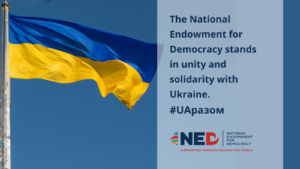 Ukraine’s defense should become the valiant first chapter of a global democratic revival, according to a joint statement from the NED and its four core partners—the National Democratic Institute (NDI), the International Republican Institute (IRI), the Center for International Private Enterprise (CIPE) and the Solidarity Center—expressing support and solidarity with grantees, partners, staff, and their loved ones in Ukraine.
Ukraine’s defense should become the valiant first chapter of a global democratic revival, according to a joint statement from the NED and its four core partners—the National Democratic Institute (NDI), the International Republican Institute (IRI), the Center for International Private Enterprise (CIPE) and the Solidarity Center—expressing support and solidarity with grantees, partners, staff, and their loved ones in Ukraine.
Putin’s attack on Ukraine comes at a moment when democratic institutions are being systematically undermined across the globe and authoritarian regimes are growing in number and strength, it states. Alert to a great danger, democratic societies should make every effort to secure the freedoms we cherish, the institutions we have built, and the values we have affirmed, to promote a more secure, just, and peaceful world. RTWT
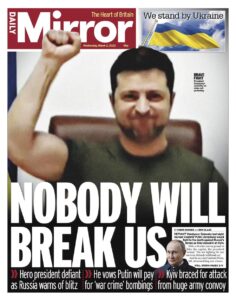
Screen grab
Ukrainian president Volodymyr Zelensky (right) warned Putin that “No bunker can protect you from God” after Russian forces targeted the Cathedral of the Assumption [Uspensky Sobor] in its assault on Kharkiv, according to Ukrayinska Pravda.
“It is a holy place. Now, wrecked by the war. Even this does not deter them! They count on the fact that God’s retribution isn’t instant. But He sees. And answers. You cannot hide from His answers,” said Zelensky, who announced that the first of 16,000 foreign volunteers had arrived to fight in Ukraine’s foreign legion.
Ukraine had experienced two world wars, three Holodomors, the Holocaust, Chernobyl, the Russian take over of Crimea and the war in eastern Ukraine, he said, so “if someone thinks that, having overcome all of this, Ukrainians — any of us — will be scared, broken or willing to surrender — he knows nothing about Ukraine.”
The spirit of 1989 isn’t dead
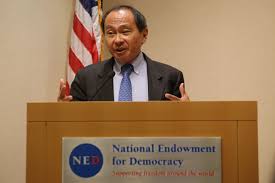
Former NED board member Francis Fukuyama
This is why the current war in Ukraine matters to all of us, says Stanford University’s Francis Fukuyama. The unprovoked Russian aggression and shelling of the peaceful Ukrainian cities Kyiv and Kharkiv has reminded people in the most vivid way possible what the consequences of illiberal dictatorship are. Putin’s Russia is seen clearly now not as a state with legitimate grievances about NATO expansion but as a resentful, revanchist country intent on reversing the entire post-1991 European order, he writes for The Financial Times.
The Russian invasion will stain the international reputation of the Russian state for decades to come, according to 165 Nobel laureates.
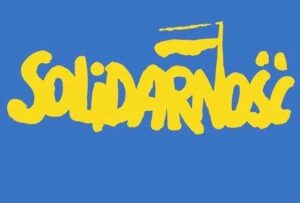 In a move that recalls the infamous attack of Nazi Germany on Poland in 1939 (using similar tricks of feigned provocation) and on the Soviet Union in 1941, the government of the Russian Federation, led by President Putin, has launched an unprovoked military aggression — nothing else but a war — against its neighbor, Ukraine. We choose our words carefully here, for we do not believe the Russian people have a role in this aggression, they wrote in a statement of solidarity with Ukraine published in The Economist.
In a move that recalls the infamous attack of Nazi Germany on Poland in 1939 (using similar tricks of feigned provocation) and on the Soviet Union in 1941, the government of the Russian Federation, led by President Putin, has launched an unprovoked military aggression — nothing else but a war — against its neighbor, Ukraine. We choose our words carefully here, for we do not believe the Russian people have a role in this aggression, they wrote in a statement of solidarity with Ukraine published in The Economist.
Russia’s security concerns can be addressed within the framework of the UN Charter, the 1975 Helsinki Final Act, and the 1990 Paris Charter, the signatories add. To make war, as President Putin and his collaborators have done, is an unwarranted, bloody, and unproductive way to a future. RTWT
On unprovoked military aggression – An open letter in support of Ukraine https://t.co/wOJ9jQOJha
— Democracy Digest (@demdigest) March 4, 2022
As Ukraine confronts Russia’s full-scale attack, the Ukrainian Volunteer Service (UVS), nurtures a culture of volunteering by providing opportunities for democratic engagement.
“We see our goal right now to be a center that can quickly mobilize volunteers and direct them to the most needed causes and organizations,” says Anna Bondarenko, UVS founder and CEO. “And we ensure that volunteers are safe, protected, and mentally strong, which is really important in our case right now.”
Focusing on best practices of community-building at the local level, the Odessa-based nonprofit organization has conducted training programs, hosted a leadership school, and supported public-private partnerships to empower thousands of citizens of all ages over 500 organizations since its founding in 2017.
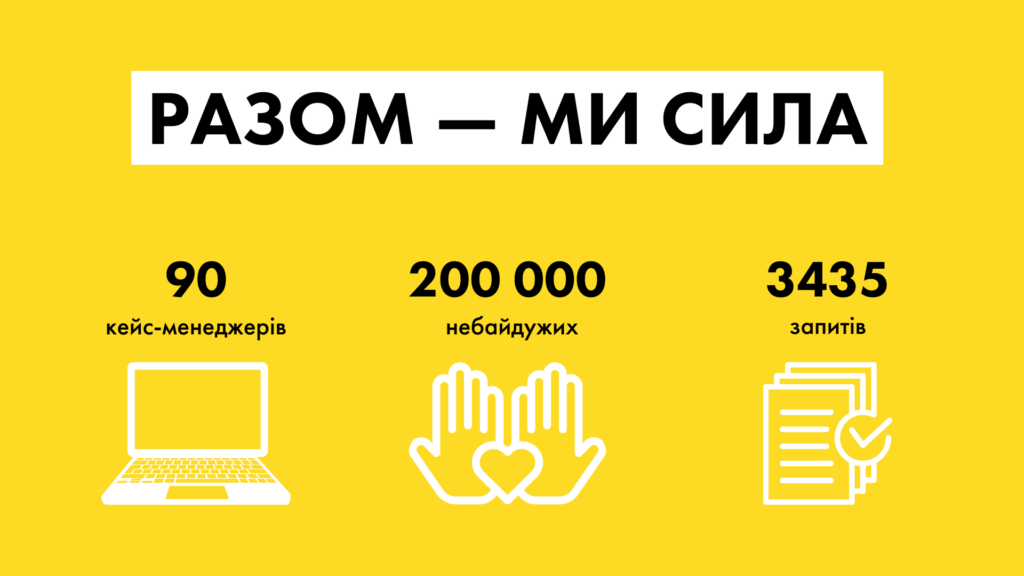
90 case managers received 3,435 requests for assistance; 200,000 volunteers are ready to help.
Russia’s invasion of Ukraine has shattered the unholy alliance of aspiring autocrats that viewed Putin as the ultimate strongman leader, argues Susan Stokes, Director of the Chicago Center on Democracy. Hungary’s Viktor Orbán has denounced the invasion, while Poland is accepting a flood of Ukrainian refugees. Both Hungary and Poland have new reason to value their NATO membership, she writes for Project Syndicate.
The estimated 190,000 Russian military personnel involved in the invasion would have difficulty holding an area of roughly the size and population of Afghanistan, adds Jay Weiser, associate professor of law emeritus at Baruch College. Russian units have also recently been deployed to suppress local uprisings in the former Soviet republics of Belarus and Kazakhstan, which might not remain quiescent if Putin opens yet another front.
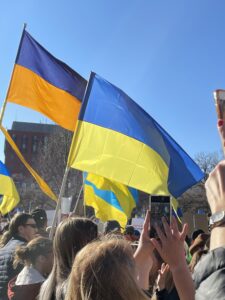 As the United States discovered in Vietnam and Iraq, and both America and the Soviet Union discovered in Afghanistan, insurgencies can be hard to suppress when there is support from both locals and a contiguous foreign power, he writes for The American Purpose. While Vladimir Putin may dream of the glorious restoration of Kyivan Rus and the Soviet Union under Russian rule, Ukrainians don’t. The history of 20th-century Ukrainian insurgency suggests that the invasion will produce a long-running, bloody response.
As the United States discovered in Vietnam and Iraq, and both America and the Soviet Union discovered in Afghanistan, insurgencies can be hard to suppress when there is support from both locals and a contiguous foreign power, he writes for The American Purpose. While Vladimir Putin may dream of the glorious restoration of Kyivan Rus and the Soviet Union under Russian rule, Ukrainians don’t. The history of 20th-century Ukrainian insurgency suggests that the invasion will produce a long-running, bloody response.
As Ukrainians defend their country against the Russian invasion, journalists there and in other post-Soviet states guard their fragile press freedoms, notes Ann Cooper, a former Joan Shorenstein Fellow at Harvard Kennedy School’s Shorenstein Center on Media, Politics and Public Policy.
The Kyiv Independent’s rapid startup was enabled by in-kind help from sympathetic Ukrainian businesses, by a nearly $100,000 grant from the European Endowment for Democracy, and by financial pledges from several hundred individuals inside and outside Ukraine, she writes for Niemann Reports:
- The Europe-based Center for Media, Data and Society reported in 2020 that without foreign philanthropy Georgia’s independent media would have developed ‘much less and at a much slower pace.’ The U.S.-based National Endowment for Democracy, one of several donors listed by civil.ge, is the largest foreign supporter of Georgian media, according to the report.
- Despite its successes, Armenia’s Hetq continues to rely on foreign donors for 90 percent of its budget, according to deputy editor Liana Sayadyan. Those donors include the European Union, individual E.U. governments, and U.S. entities such as the National Endowment for Democracy, many of which also underwrite two other independent outlets in the country, Civilnet and EVN Report.
- With a population of less than 3 million and an economic rating as one of Europe’s poorest countries, Moldova has a small ad market to begin with. With much of that market under political control, independent newsrooms can count on little support from advertising. NewsMaker, for example, makes only about 20 percent of its budget from ads, says Galina Vasilieva, editor-in-chief of the seven-year-old independent site. The rest comes from foreign funders such as George Soros’s Open Society Foundations and the U.S.-funded National Endowment for Democracy. RTWT
Free media are surviving with support from local donors and groups like the @NEDemocracy & @EEDemocracy in Ukraine, Moldova, Georgia, Armenia and beyond, former @ShorensteinCtr fellow Ann Cooper writes for @NiemanReports NB @CIMA_Media https://t.co/Zaw03u1UmJ
— Democracy Digest (@demdigest) March 4, 2022
Ukrainians’ true bravery
The travails of liberalism will not end even if Putin loses, according to Stanford’s Fukuyama, a former NED board member. China will be waiting in the wings, as well as Iran, Venezuela, Cuba and the populists in western countries. But the world will have learnt what the value of a liberal world order is, and that it will not survive unless people struggle for it and show each other mutual support.
The Ukrainians, more than any other people, have shown what true bravery is, and that the spirit of 1989 remains alive in their corner of the world. For the rest of us, it has been slumbering and is being reawakened, he concludes. RTWT
Today is my birthday! I appeal to @POTUS @BorisJohnson world leaders to make present to my nation! I have a dream! God will help my dream to come true . #StopPutin pic.twitter.com/9Friltxv2P
— Hanna Hopko (@HopkoHanna) March 4, 2022







